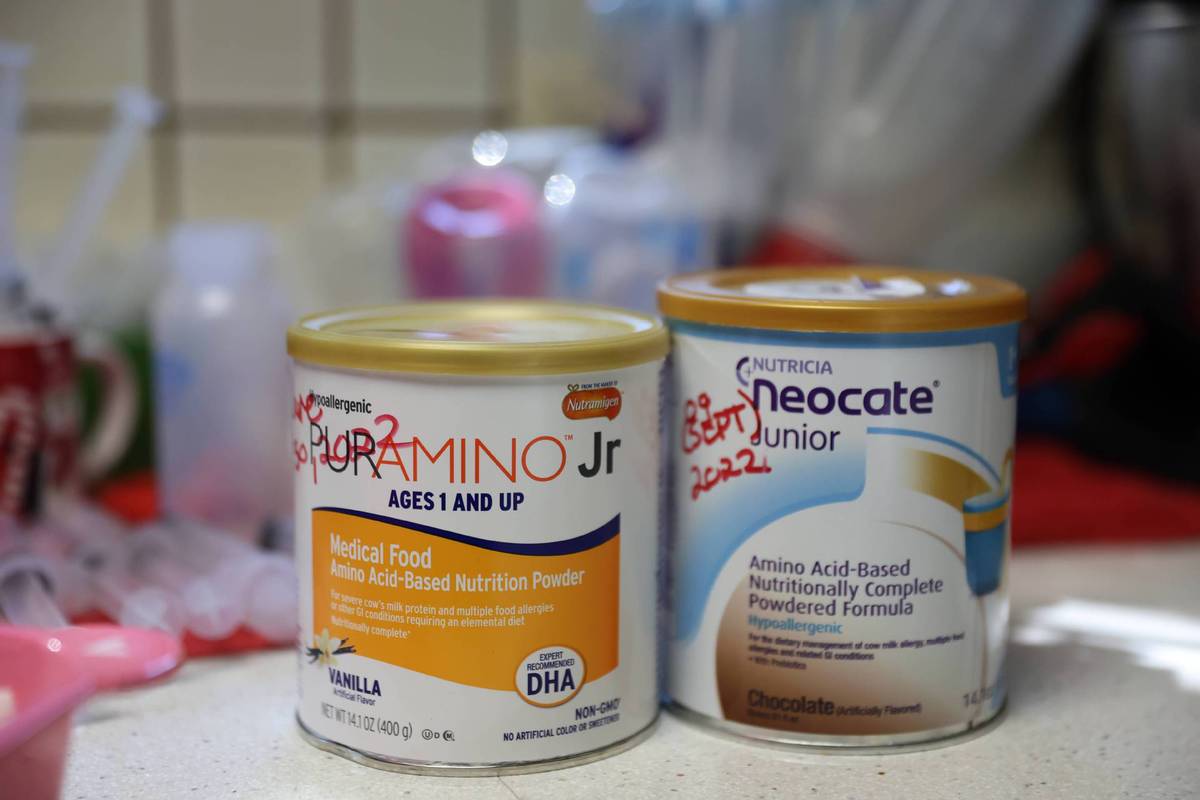美媒:美国“奶粉荒”持续,贸易保护反噬自身 Why America’s baby formula crisis is an entirely self-inflicted problem
中国日报网 2022-05-23 16:54

2022年5月份,在雅培奶粉事件、供应链问题和通货膨胀等多重因素作用下,美国奶粉危机愈演愈烈。美国商业杂志《快公司》5月18日报道分析,美国为维护市场控制地位、严格控制配方奶粉进口而高筑关税壁垒,加剧了奶粉荒短时间难以缓解的局面。全美范围内的婴儿配方奶粉短缺,是美国大搞贸易保护主义、最终破坏本国产业链供应链稳定的又一例证。

以下为文章摘编:
In the two years since COVID first arrived in the US, Americans have had to get used to things being out of stock. Refrigerators, stoves, washers—at various points, global supply-chain issues have meant that each of these has been tough to come by. But while those stock-outs may have been annoying, Americans today are dealing with a shortage that’s actually serious: a dearth of infant formula. In the first week of May, the national out-of-stock rate for infant formula was 43%, and there’s no sign that things have improved since. And this supply-chain problem is different from those earlier ones in two ways. First, formula is not a product you can afford to wait for. (Babies need to be fed!) Second, this problem is largely self-inflicted.
自美国首次发现新冠病毒的两年间,美国人不得不习惯缺货。冰箱、炉灶、洗衣机都出现过缺货,全球供应链问题意味着这些产品都很难到货。尽管这些商品缺货可能令人恼火,但今天的美国人正在应对一个很严重的短缺问题:婴儿配方奶粉缺货。在5月的第一周,婴儿配方奶粉的全美缺货率为43%,此后没有任何有所改善的迹象。婴儿奶粉供应问题与之前的供应链问题有两个区别。首先,配方奶粉是等不了的产品。(婴儿需要喂奶!)其次,这个问题主要是美国“咎由自取”。
The proximate cause of the shortage was the shutdown of Abbott Laboratories’s formula factory in Sturgis, Michigan, and the company’s voluntary recall of powder-formula products made there, after FDA inspectors found a bacteria called Cronobacter inside the plant. (Months earlier, four infants who consumed formula from the factory had become ill with Cronobacter infections, and two had died, though Abbott says that the illnesses were not caused by consuming its products.) But the reason that shutdown was so consequential is that we’ve created a system in which almost all the formula consumed in the US is made by a small number of companies in a small number of factories; taking just one of them offline has massive ripple effects across the economy. Parents in Canada and Europe aren’t having any trouble finding baby formula. It’s only American parents who have been left scrambling.
短缺的直接原因是雅培公司关闭了在密歇根州斯特吉斯的配方奶粉工厂,该公司在其工厂内发现阪崎肠杆菌后,主动召回该工厂生产的配方奶粉产品。(几个月前,四名食用该工厂配方奶粉的婴儿感染了阪崎肠杆菌,两名婴儿死亡,不过雅培表示,这些疾病并非由食用其产品引起的。)但停产的影响之所以如此之大,是因为美国消费的几乎所有配方奶粉都是由少数几家公司在少数几家工厂生产的;仅仅让其中一个关闭就对整个经济造成大规模连锁反应。加拿大和欧洲的父母都没有遇到婴儿配方奶粉缺货的问题。只有美国的父母在苦苦挣扎。
The numbers behind the crisis are pretty straightforward. Three companies—Abbott, Mead, and Nestle—account for the vast majority of formula sold in the US, and Abbott alone has more than 40% of the market—and 98% of the formula sold in the US is made in the US In other words, there is essentially no foreign competition. While countries like Germany and Switzerland have robust infant-formula industries, their companies sell almost nothing here directly.
这场危机背后的数字一目了然。雅培、美赞臣和雀巢三家公司占据了在美国销售的绝大多数配方奶粉,仅雅培一家就拥有40%以上的市场份额,而在美国销售的98%的配方奶粉是在美国制造的。换句话说,基本上没有外国竞争。虽然德国和瑞士等国家拥有强大的婴儿配方奶粉行业,但它们的公司在美国几乎没有直接销售任何产品。
That’s not because of a lack of demand for or interest in European baby formula; on the contrary, you can read myriad stories online about American parents going to great lengths to import formula made by companies like HiPP and Holle. Instead, there are no almost-legal imports from Europe because we have a tariff and regulatory system effectively designed to keep them out.
这并不是因为美国人对欧洲婴儿配方奶粉缺乏需求或兴趣;相反,你可以在网上读到无数关于美国父母千方百计进口喜宝和泓乐等公司生产的配方奶粉的故事。但几乎无法从欧洲合法进口,因为美国有一个有效的关税和监管体系阻止其进入。
That system starts with tariffs. Imported baby formula is subject to a tariff that’s typically 17.5%. On top of that, there’s an abstruse tariff-rate quota system, which means that once a certain amount of formula is imported from a country, it gets slapped with an extra tariff in addition to the original one. So any foreign-formula manufacturer who wants to sell its products in the US is going to be at a serious cost disadvantage to the Abbotts of the world.
这一体系从关税开始。进口婴儿配方奶粉的关税通常为17.5%。除此之外,还有一套复杂的关税率配额制度,这意味着一旦从一国进口的配方奶粉达到一定数量,就会在原来的配方奶粉关税基础上再加征额外关税。因此,任何想在美国销售其产品的外国配方奶粉制造商都将在成本上严重高于雅培。
To even get to that point, though, foreign-formula manufacturers have to satisfy not only the FDA’s nutritional requirements but also the agency’s surprisingly detailed labeling requirements. The FDA doesn’t officially approve infant formulas (the way it approves, say, drugs). But any product that doesn’t meet its rules—which include things like how ingredients should be listed on the label—can’t be sold in the US.
然而,为了进入美国市场,外国配方奶粉制造商不仅必须满足美国食品药品监督管理局(FDA)的营养要求,还必须满足其异常详细的标签要求。FDA并不正式批准婴儿配方奶粉(就像它批准药物那样)。但是,任何不符合其规定的产品(包括如何在标签上列出成分等)都不能在美国销售。
None of this is because European infant formula doesn’t meet US standards: A 2019 study of 13 brands found that all of them met 15 out of 16 nutritional requirements. Indeed, the EU has its own nutritional requirements, which have actually been updated more frequently than those in the US.
这些限制都不是因为欧洲婴儿配方奶粉不符合美国标准:2019年对13个品牌的研究发现,所有品牌都符合16个营养要求中的15个(由于配方的标注方式,该研究的作者无法衡量这些品牌是否符合美国对亚油酸的要求标准)。事实上,欧盟有自己的营养要求标准,实际上比美国的营养要求更新得更频繁。
The key here is that all these restrictions fit together to keep foreign producers out of the market. The economic incentives to go to all that trouble and expense are small because the tariffs and tariff-rate quotas limit their potential sales and profits. So they’ve understandably chosen not to enter the US market, leaving it to the big domestic players.
这里的关键是,所有这些限制都是为了阻止外国厂商进入美国市场。由于关税和关税配额限制了外国品牌潜在的销售和利润,为此付出的精力和成本能够得到的经济回报很小。因此,可以理解他们选择不进入美国市场,把市场留给了美国大公司。
It should be said that the motivation behind the FDA requirements is understandable. But in practical terms, the concern with safety has become a recipe for protecting the current oligopoly of formula manufacturers in the US And this is not a problem only in the infant-formula market. You can see a similar phenomenon at work in the generic-drug market, where FDA rules often mean that US consumers have only one choice of drug—and have to pay through the nose for it—even when there are multiple versions of the drug being made in Europe.
应该说,FDA提出这些要求背后的动机是可以理解的。但实际上,对安全的担忧已成为保护美国配方奶粉制造商当前寡头垄断的一种方法,而这不仅仅是婴儿配方奶粉市场的问题。你可以在非专利药市场上看到类似的现象,FDA的规定通常意味着美国消费者只有一种药物选择,即使在欧洲生产多个版本的药物,也必须为其支付高昂的费用。
In a broader sense, what the infant-formula crisis speaks to is the fact that setting up barriers that make it harder for Americans to buy stuff from the rest of the world—which is something Donald Trump did a lot of, and that Joe Biden has done little to roll back—makes the US economy more vulnerable, not less, to supply shocks. Free trade has become oddly unpopular in Washington, D.C. over the past six years. But the infant-formula market could use a lot more of it.
从更广泛的意义上说,婴儿配方奶粉危机说明了这样一个事实:设置贸易障碍,使美国人更难从世界其他地方购买东西,这使得美国经济更容易受到供应冲击。为此唐纳德·特朗普“功不可没”,而乔·拜登对此几乎没有纠正。在过去六年中,自由贸易在华盛顿特区变得很不受欢迎。但婴儿配方奶粉市场可以有更多的自由贸易。
来源:Fast Company
编辑:董静

















 英语点津微信
英语点津微信 双语小程序
双语小程序